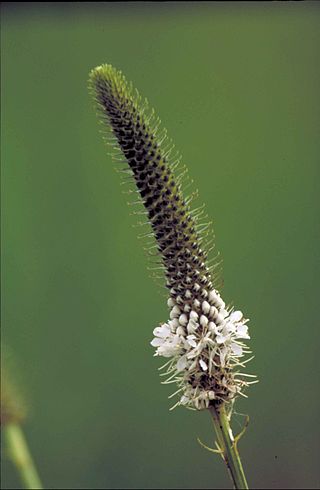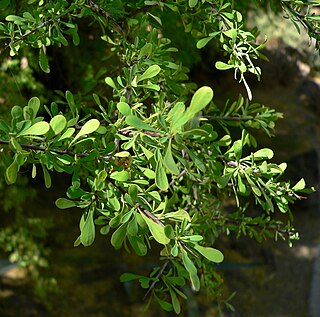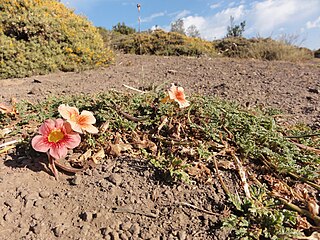
Schinus is a genus of flowering trees and tall shrubs in the sumac family, Anacardiaceae. Members of the genus are commonly known as pepper trees. The Peruvian pepper tree is the source of the spice known as pink peppercorn.

Calandrinia is a large genus of flowering plants known as purslanes and redmaids. It includes over 100 species of annual and perennial herbs which bear colorful flowers in shades of red to purple and white. Plants of this genus are native to Australia, western South America, Central America, and western North America. Some species have been introduced to parts of New Zealand, southern Africa, Asia, and Europe.

Dalea is a genus of flowering plants in the legume family, Fabaceae. Members of the genus are commonly known as prairie clover or indigo bush. Its name honors English apothecary Samuel Dale (1659–1739). They are native to the Western hemisphere, where they are distributed from Canada to Argentina. Nearly half of the known species are endemic to Mexico. Two species of Dalea have been considered for rangeland restoration.

Condalia is a genus of spiny shrubs in the tribe Rhamneae of the buckthorn family, Rhamnaceae. It was named for Antonio Condal, an 18th century Spanish physician. Members of the genus are native to tropical and subtropical deserts and xeric shrublands in North and South America. The ranges of each species vary considerably; some are confined to only a few square miles, while others can be found on an area up to 1,000 sq mi (2,600 km2).

Dombeya is a flowering plant genus. Traditionally included in the family Sterculiaceae, it is included in the expanded Malvaceae in the APG and most subsequent systematics. These plants are known by a number of vernacular names which sometimes, misleadingly, allude to the superficial similarity of flowering Dombeya to pears or hydrangeas. Therefore, the genus as a whole is often simply called dombeyas. The generic name commemorates Joseph Dombey (1742–1794), a French botanist and explorer in South America, involved in the notorious "Dombey affair", embroiling scientists and governments of France, Spain, and Britain for more than two years.

Antirhea is a genus of flowering plants in the family Rubiaceae.

Piscidia is a genus of flowering plants in subfamily Faboideae of the family Fabaceae. It includes seven species of trees, and rarely shrubs, native to the tropical Americas, ranging from northern Mexico and Florida through Central America and the Caribbean to Venezuela and Peru. Typical habitats include seasonally-dry tropical forest, woodland, and bushland, often on rocky hills, with some species restricted to limestone substrates.

Argylia is a genus of flowering plants that is a member of the family Bignoniaceae.

Hermannia is a genus of flowering plants in the mallow family, Malvaceae. It comprises at least 65 species with many more species as yet unresolved.

Balbisia is a genus of flowering plants belonging to the family Francoaceae. It is also in the Vivianiaceae subfamily.

Cienfuegosia is a genus of plants, in the family Malvaceae and placed in the tribe Gossypieae. Species can be found in central and south America, Africa including the Arabian peninsula.

Acaulimalva is a genus of plants in the family Malvaceae. It contains 21 species that are found in South America.
Tarasa is a genus of flowering plants belonging to the family Malvaceae.
Eremocharis is a genus of flowering plants belonging to the family Apiaceae.
Neobaclea is a monotypic genus of flowering plants belonging to the family Malvaceae. It only contains one known species, Neobaclea crispifolia(Cav.) Krapov.

Gaya is a genus of flowering plants belonging to the family Malvaceae. It has been classed in the Malvoideae subfamily and the Malveae tribe.













